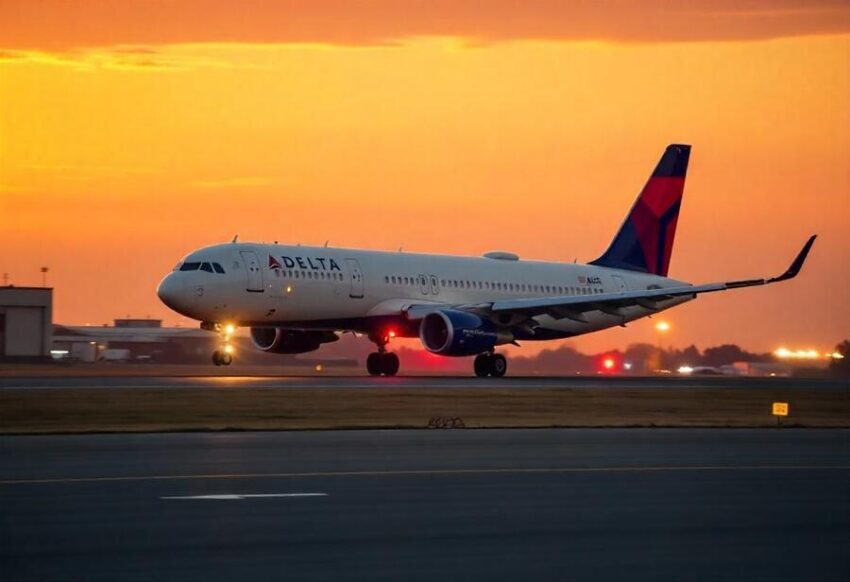Gevolgen van de voorgestelde Amerikaanse tarieven voor Delta Air Lines
Delta Air Lines heeft haar ernstige bezorgdheid geuit over de voorgestelde tarieven op geïmporteerde vliegtuigen en onderdelen, en wijst op een potentiële crisis die haar activiteiten aanzienlijk zou kunnen onderbreken en miljoenen reizigers zou kunnen treffen. Een recente aanvraag bij het Amerikaanse ministerie van Handel onderstreept het delicate evenwicht waarin de luchtvaartmaatschappij opereert en dringt aan op voorzichtigheid bij verdere tariefescalaties.
Zorgen over de aankoop van vliegtuigen
Volgens de luchtvaartmaatschappij zouden deze tarieven een belemmering kunnen vormen voor hun vermogen om essentiële in het buitenland gemaakte vliegtuigen aan te schaffen die nodig zijn om de vluchtschema's in stand te houden. Met de bestaande tarieven die al een 10% heffing op de meeste geïmporteerde vliegtuigen en onderdelen opleggen, zou elke nieuwe heffing kunnen leiden tot aanzienlijke annuleringen van vluchten, wat uiteindelijk het reizen voor ongeveer 10 miljoen passagiers per jaar zou verstoren.
De achtergrond van deze tarieven
De huidige discussie komt voort uit een onderzoek in het kader van Sectie 232, dat tot doel heeft potentiële nationale veiligheidsrisico's in verband met import te evalueren. Als het onderzoek leidt tot strengere tariefregels, kunnen luchtvaartmaatschappijen met nog grotere hindernissen te maken krijgen. Dit is vooral dringend voor Delta, gezien de grote afhankelijkheid van zowel binnenlandse als internationale vliegtuigen.
Effecten op dienstverlening
Delta's recente aankoop van 47 Airbus-vliegtuigen uit landen als Canada, Duitsland en Frankrijk benadrukt de afhankelijkheid van buitenlandse fabrikanten. Als de tarieven de toegang tot deze vliegtuigen beperken, zou Delta in de problemen kunnen komen en haar uitgebreide netwerk niet effectief kunnen bedienen. Deze situatie kan niet alleen de operatie van de luchtvaartmaatschappij lamleggen, maar ook leiden tot wijdverspreide verstoringen van de dienstverlening op belangrijke reisroutes.
Implicaties voor de hele sector
De grotere handelsomgeving compliceert de huidige situatie van de luchtvaartmaatschappij. Amerikaanse luchtvaartmaatschappijen die al worstelen met de bestaande tarieven merken dat de financiële gevolgen zwaar wegen op hun operationele kosten. Mochten er nieuwe tarieven komen, dan zou de extra financiële druk een nadelige invloed kunnen hebben op het vermogen van Delta om haar vloot in stand te houden en uit te breiden.
Samenwerken voor verandering
In het licht van deze uitdagingen heeft Delta zich aangesloten bij verschillende belanghebbenden binnen de luchtvaartsector om te pleiten tegen tariefverhogingen. De collectieve stem van de luchtvaartindustrie benadrukt dat opgeblazen tarieven de operationele veiligheid in gevaar brengen, wereldwijde toeleveringsketens verstoren en extra hindernissen opwerpen voor zowel luchtvaartmaatschappijen als fabrikanten.
Het belang van internationale samenwerking
De VS heeft altijd vertrouwd op wereldwijde partnerschappen voor de productie van vliegtuigen. Hoewel lokale productie een rol speelt, komen veel cruciale onderdelen van overzee. Tarieven gericht op deze import kunnen de productiekosten doen stijgen, vliegtuigleveringen vertragen en onderhoudsprijzen doen stijgen - allemaal factoren die luchtvaartmaatschappijen zoals Delta kunnen belasten.
Invloed op handelsovereenkomsten
De mogelijke verstoring van de Overeenkomst van 1979 inzake de burgerluchtvaart, die belastingvrije invoer tussen de VS en andere landen mogelijk maakt, zou de zaken nog ingewikkelder kunnen maken. Deze overeenkomst heeft in het verleden gezorgd voor een jaarlijks handelsoverschot van $75 miljard binnen de lucht- en ruimtevaartsector, waardoor een concurrerende markt voor vliegtuigen en onderdelen werd gegarandeerd. Elke verandering zou nadelig kunnen zijn en de operationele effectiviteit van Delta op de wereldmarkt kunnen beperken.
Onbedoelde gevolgen van de tarieven
De invoering van hogere tarieven kan onbedoeld zowel reizigers als luchtvaartmaatschappijen schaden door de kosten op te drijven en het aanbod van essentiële vliegtuigen te beperken. Voor Delta blijft de tijdige levering van nieuwe vliegtuigen van het grootste belang om aan de vraag van klanten te voldoen en concurrerend te blijven in het luchtvaartlandschap.
Het grotere plaatje
De waarschuwingen van Delta sluiten aan bij bredere trends in de luchtvaartindustrie, die zich moet aanpassen aan het voortdurend veranderende internationale handelsbeleid. Luchtvaartmaatschappijen die afhankelijk zijn van een mix van in de VS gebouwde en in het buitenland gebouwde vliegtuigen worden bijzonder kwetsbaar te midden van deze regelgevende verschuivingen, die hun capaciteit om passagiers effectief te bedienen onder druk kunnen zetten.
Conclusie: Navigeren door de toekomst van vliegreizen
De waarschuwing van Delta illustreert de kettingreactie van voorgestelde tarieven op vliegreizen en zet de sector onder druk om een evenwicht te vinden in internationale transacties. Het weerspiegelt een breder sentiment en past in het steeds veranderende verhaal van het reisbeleid en de reizen van consumenten.
Een gezamenlijke aanpak van tariefdiscussies is essentieel om verstoring van luchtdiensten te voorkomen. De essentie van deze bezorgdheid komt tot uiting in de behoefte aan een transparante beleidsvorming die de binnenlandse belangen beschermt zonder de innovatie en dienstverlening te verstikken.
Omdat het luchtreizenlandschap blijft veranderen, blijft het van cruciaal belang om flexibele en betrouwbare vervoersopties te hebben. Platformen zoals GetTransfer.com stellen reizigers in staat om op efficiënte wijze gepersonaliseerde transfers te regelen en zorgen voor een naadloze ervaring, ongeacht de verschuivingen in de markt. Gebruikers kunnen eenvoudig hun favoriete voertuigen selecteren, gedetailleerde aanbiedingen bekijken over het merk en model en vertrouwen op de transparante tariefstructuren die GetTransfer.com biedt. In een landschap dat zo sterk beïnvloed wordt door regelgeving, dient GetTransfer.com als een standvastige bondgenoot voor het maken van geïnformeerde keuzes tijdens het reizen.
Samengevat, de bezorgdheid over de tarieven geeft de onderlinge verbondenheid van de wereldwijde reisindustrie aan en onderstreept het belang van strategische vooruitziendheid. Persoonlijke ervaringen en beslissingen kunnen reizigers helpen om effectief te navigeren door deze veranderingen, vooral wanneer betrouwbare diensten zoals GetTransfer.com beschikbaar zijn. Door gebruik te maken van dit platform kunnen reizigers genieten van stressvrij vervoer en er zeker van zijn dat ze hun bestemming op een efficiënte manier bereiken zonder de bank te breken. Boek je rit nu op GetTransfer.com.


Reacties